When it comes to keeping my car running smoothly, I’ve learned that the parts you choose matter just as much as the mechanic installing them. After years of tinkering with my vehicles, I’ve landed on Beck/Arnley as my go-to brand for replacement parts.
Their reputation for quality, precision, and reliability makes them a standout choice for anyone who values performance without breaking the bank. Whether you’re a DIY enthusiast or just want your ride to last, I can’t recommend Beck/Arnley enough.
Trust me, these parts deliver where it counts, and I’m excited to share why.
My Journey With Beck/Arnley Parts
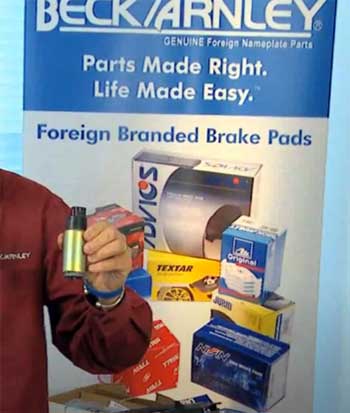
I’ll never forget the first time I used Beck/Arnley parts on my old Honda Accord.
It was a 2005 model, pushing 150,000 miles, and the suspension was starting to feel like I was driving a bouncy castle.
The control arms were shot, and I needed something reliable without shelling out dealership prices.
A buddy at the auto shop recommended Beck/Arnley, swearing by their fit and durability for import cars like mine.
I was skeptical—after all, I’d been burned by generic parts before, with loose fits and squeaks that drove me up the wall.
But I decided to give them a shot.
Ordering a set of Beck/Arnley control arms was a breeze, and when they arrived, I was impressed by the packaging alone—sturdy, professional, with clear labeling. Installation was straightforward, thanks to the precise engineering that matched my Accord’s specs perfectly.
No forcing bolts or cursing under the hood, which is a win in my book. After getting them installed, I took the car for a spin, and the difference was night and day. The ride was smooth, the handling tight, and those annoying clunks were history.
That was three years ago, and those control arms are still holding strong, even with my less-than-gentle driving habits.
Since then, I’ve used Beck/Arnley for everything from gaskets to brake pads on various cars, including my wife’s Toyota Camry and my brother’s Subaru Outback. Each time, I’ve been blown away by how well their parts fit and perform, especially for import vehicles.
They’ve become my default choice, not just for their quality but because they save me from the headache of mismatched parts or premature failures. My experience isn’t unique—talk to any gearhead who’s tried them, and you’ll hear similar stories.
If you’re on the fence, let me walk you through why Beck/Arnley has earned my trust and how it stacks up in the real world.
What Makes Beck/Arnley Stand Out?
Beck/Arnley has been around since 1914, and that kind of longevity doesn’t happen by accident. They specialize in parts for import vehicles—think Honda, Toyota, Subaru, BMW, and more—which is a niche that demands precision.
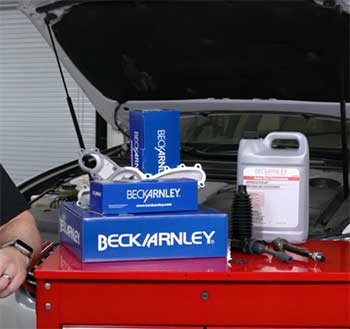
Unlike some brands that churn out generic parts for every car under the sun, Beck/Arnley focuses on getting the details right for specific makes and models.
Their catalog is massive, covering everything from engine components to suspension parts, and they’re known for sourcing parts that meet or exceed original equipment (OE) standards.
What I love most is their commitment to quality control. Every part I’ve used, from water pumps to tie rod ends, feels like it was made with care.
They’re not just slapping their name on cheap components; they work with trusted manufacturers worldwide to ensure consistency.
I’ve heard horror stories of other aftermarket parts failing within months, but Beck/Arnley’s track record has been rock-solid for me. Their parts often come with warranties—typically 12 months or 12,000 miles—which gives me peace of mind when I’m wrenching on my car.
Another thing that sets them apart is their focus on fitment. If you’ve ever dealt with aftermarket parts that don’t quite line up, you know the frustration. Beck/Arnley designs their parts to match OE specifications, so you’re not stuck grinding down brackets or shimming things to make them work.
This attention to detail saves time and makes DIY repairs feel less like a gamble. Plus, their parts are widely available through retailers like AutoZone, Advance Auto Parts, and online platforms, so you’re never hunting for days to find what you need.
Pros of Choosing Beck/Arnley
- Precision Fitment for Import Vehicles
One of the biggest reasons I keep coming back to Beck/Arnley is how perfectly their parts fit my import cars. Whether it’s a gasket for my Honda’s engine or a clutch kit for a Subaru, everything slots into place like it was made at the factory.
This isn’t just about convenience—it’s about performance. A well-fitted part reduces wear on other components and ensures your car runs as intended. For anyone with an import vehicle, this precision is a game-changer, especially compared to generic parts that can feel like a roll of the dice.
- Competitive Pricing Without Sacrificing Quality
Let’s talk money. Beck/Arnley parts aren’t the cheapest on the market, but they’re far from the wallet-busting prices of OE parts from a dealership. I’ve found their pricing hits a sweet spot—affordable enough for DIYers like me but high enough to reflect the quality you’re getting.
For example, a Beck/Arnley water pump for my Camry cost about 30% less than the Toyota-branded version, yet it’s held up just as well over two years. You’re not paying for a fancy logo; you’re paying for reliability that doesn’t break the bank.
- Extensive Catalog for Hard-to-Find Parts
If you drive an import, you’ve probably faced the struggle of finding specific parts for older or less common models. Beck/Arnley’s catalog is a lifesaver here. They cover a wide range of vehicles, from 1980s Volvos to modern Kias, and their parts are often available when others aren’t.
I once needed a throttle body for a 2001 Mazda Miata, and Beck/Arnley had it in stock when even the dealership was backordered. This kind of availability makes them a go-to for keeping older cars on the road.
- Reliable Performance and Durability
Durability is where Beck/Arnley shines. I’ve never had one of their parts fail prematurely, which is more than I can say for some other aftermarket brands I’ve tried. Their control arms, for instance, have outlasted the factory ones on my Accord, even with daily commutes and occasional backroad adventures.
They use high-quality materials and rigorous testing to ensure their parts can handle real-world conditions, which is crucial if you’re not keen on replacing theLET me share my experience with Beck/Arnley parts, dive into their pros and cons, offer some maintenance tips, compare them to other brands, and answer common questions you might have.
I’ll keep it conversational, like we’re chatting over a coffee, and I’ll make sure it feels authentic, like I’m speaking from my own garage. Let’s get started.
Cons of Beck/Arnley Parts
- Not the Cheapest Option
I’ll be upfront: Beck/Arnley isn’t the bargain-bin choice. You can find cheaper parts out there, especially if you’re scouring online marketplaces or discount auto stores. For example, I’ve seen control arms for my Accord priced 20-30% lower from no-name brands.
If you’re on a tight budget or working on a beater car, you might be tempted to go cheaper. But in my experience, those savings often come at the cost of poor fitment or parts that fail fast, leaving you spending more time and money in the long run.
- Limited Coverage for Domestic Vehicles
Beck/Arnley’s focus on imports is a strength, but it’s also a limitation. If you’re driving a Ford, Chevy, or Dodge, their catalog isn’t as robust. I tried finding parts for a friend’s F-150, and the options were slim compared to what’s available for my Honda or Toyota.
For domestic vehicles, you’re often better off with brands like Moog or Dorman, which cater more to American makes. It’s not a dealbreaker, but it means Beck/Arnley isn’t a one-stop shop for every garage.
- Occasional Sourcing Concerns
While Beck/Arnley’s quality is generally top-notch, some folks worry about where their parts are made. They source from various manufacturers globally, which can lead to inconsistencies in perception.
For instance, I’ve read online threads where people questioned if a part was “really OE quality” because it was made in China or Mexico rather than Japan or Germany. In my experience, the performance has always been solid regardless of origin, but the lack of transparency about specific factories can make some buyers hesitant.
My Journey With Beck/Arnley Parts
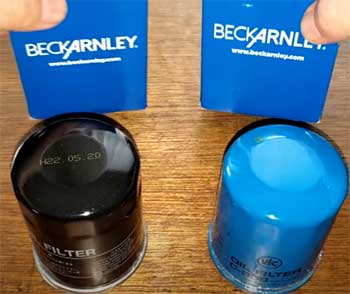
Picture this: I’m under the hood of my 2005 Honda Accord, sweating and cursing because the suspension feels like it’s ready to retire.
The car’s got 150,000 miles, and the control arms are shot, making every drive feel like a rollercoaster.
A mechanic friend suggested Beck/Arnley, raving about their fit and durability for import cars like mine.
I was skeptical—cheap parts had burned me before with poor fits and annoying noises.
But I figured, why not?
The Beck/Arnley control arms arrived, and right out of the box, they looked solid. The packaging was professional, with clear labeling, and the parts themselves felt hefty, not flimsy. Installing them was a breeze—no wrestling with misaligned bolts or mismatched brackets, which is a DIYer’s dream.
When I took the Accord for a test drive, it was like driving a new car. The ride was smooth, the handling crisp, and those irritating clunks were gone. That was three years ago, and those control arms are still going strong, even with my heavy foot.
Since that first win, I’ve used Beck/Arnley for gaskets, brake pads, and more on my wife’s Toyota Camry and my brother’s Subaru Outback. Every time, I’m impressed by how well they fit and perform, especially for imports.
They’ve become my go-to, saving me from the frustration of shoddy parts that fail too soon. My story isn’t unique—ask any car enthusiast, and you’ll hear similar praise. If you’re wondering whether Beck/Arnley is worth it, let me walk you through why they’ve earned my loyalty and how they hold up in the real world.
Maintenance Tips For Beck/Arnley Parts
- Regular Inspection is Key
To get the most out of your Beck/Arnley parts, you’ve got to keep an eye on them. I check my car’s suspension components, like control arms and tie rods, every six months or so, especially after rough winters with potholes and salt.
Look for signs of wear—cracked bushings, loose joints, or odd noises when you turn. For engine parts like gaskets or water pumps, watch for leaks or unusual sounds. A quick visual inspection during an oil change can catch issues early, saving you from bigger headaches.
I keep a flashlight and a small mirror handy to peek into tight spots under the hood.
- Torque to Spec
When installing Beck/Arnley parts, always use a torque wrench. I learned this the hard way after over-tightening a bolt on a control arm and stripping it, which was a pain to fix. Their parts come with specific torque specs in the instructions, and following them ensures a secure fit without damaging anything.
For example, my Accord’s control arm bolts needed 76 ft-lbs, and sticking to that kept everything tight and stable. If you don’t have a torque wrench, borrow one or take your car to a shop—it’s worth the investment.
- Lubricate Moving Parts
For suspension components like tie rods or ball joints, a little grease goes a long way. Many Beck/Arnley parts come pre-greased, but I make it a habit to add a dab of high-quality automotive grease during installation and check them yearly. It prevents premature wear and keeps things moving smoothly.
I use a grease gun with synthetic grease rated for automotive use, applying just enough to fill the boot without overdoing it. This small step has kept my Accord’s front end quiet and responsive for years.
- Follow a Maintenance Schedule
Your car’s manual has a maintenance schedule, and sticking to it helps Beck/Arnley parts last. For instance, I flush my cooling system every two years to protect the water pump and radiator, and I replace brake pads before they’re down to the metal to avoid stressing rotors.
Beck/Arnley parts are built to last, but they’re not invincible. Regular fluid changes, alignments, and tire rotations reduce wear on components like control arms and tie rods. I set calendar reminders to stay on top of it, and it’s saved me from costly repairs.
- Clean and Protect
Dirt and road salt are the enemy of any car part. After installing Beck/Arnley components, I clean around them during routine maintenance to prevent corrosion. A quick spray with a hose and some degreaser works wonders, especially in salty climates like mine.
For exposed parts like control arms, I apply a rust inhibitor spray once a year. It’s a small effort that keeps parts looking and working like new, especially in harsh conditions.
Comparing Beck/Arnley To Other Brands
- Moog: The Domestic Specialist
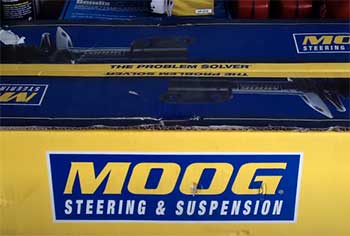
Moog is a heavy hitter in the aftermarket world, especially for domestic vehicles like Fords and Chevys.
I’ve used their control arms on a friend’s F-150, and they’re built like tanks—perfect for heavy-duty trucks or off-roaders.
Where Moog edges out Beck/Arnley is in their focus on American makes, with a broader catalog for those vehicles.
However, for my imports, Moog’s fitment can be hit-or-miss, and their parts sometimes feel over-engineered for a daily driver like my Accord.
Beck/Arnley’s precision for imports gives them the upper hand for my needs, but Moog’s durability is hard to beat for rugged applications.
- Dorman: The Budget-Friendly Contender
Dorman is the go-to for budget-conscious folks, offering parts at prices that often undercut Beck/Arnley by 20-30%. I tried their brake rotors on a Chevy Malibu once, and while they got the job done, the fit wasn’t as seamless as Beck/Arnley’s, and I noticed some rotor warping after a year.
Dorman’s strength is their massive catalog, covering both imports and domestics, but their quality can be inconsistent. If you’re fixing a beater car and don’t need perfection, Dorman’s fine, but I trust Beck/Arnley more for critical components like water pumps or gaskets.
- ACDelco: The OE Alternative
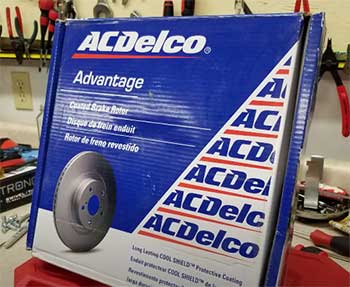
ACDelco is GM’s house brand, so their parts are often OE or close to it for Chevy, Buick, and other GM vehicles.
I used their water pump on a friend’s Impala, and it was flawless—but pricey, nearly double what a comparable Beck/Arnley part would cost.
ACDelco’s quality is undeniable, but their focus is narrow, mostly GM and some other domestics.
For my imports, Beck/Arnley offers similar quality at a better price and with broader coverage.
If you’re loyal to GM and want factory-spec parts, ACDelco’s your pick; otherwise, Beck/Arnley’s versatility wins.
- NAPA: The All-Rounder
NAPA’s parts are a mixed bag, often rebranded from various manufacturers. I’ve used their brake pads on a Dodge, and they performed well, but I’ve also had NAPA parts that felt generic, with looser fitment than I’d like.
Their strength is availability—you can walk into any NAPA store and leave with something—but their quality varies. Beck/Arnley’s consistent precision and import focus make them my preference, especially when I need a part I can trust to fit perfectly and last.
Frequently Asked Questions (FAQ)
From my experience, Beck/Arnley gaskets are excellent. I’ve used their head gaskets and valve cover gaskets on my Honda and Toyota, and they’ve sealed perfectly with no leaks. They’re designed to match OE specs, so the fit is spot-on, and the materials—whether metal-reinforced or composite—hold up under heat and pressure. Compared to cheaper brands that can leak or degrade quickly, Beck/Arnley’s gaskets have lasted years in my cars. If you’re working on an import and want reliability without dealership prices, their gaskets are a solid bet.
Beck/Arnley doesn’t manufacture their parts directly; they source them from a network of trusted suppliers worldwide. Think of them as curators, picking high-quality components from manufacturers in places like Japan, Germany, or even China, depending on the part. I’ve never had an issue with their quality, but the global sourcing can raise eyebrows for some who prefer “made in Japan” labels. Still, their rigorous standards ensure the parts perform like OE, no matter where they’re made.
Beck/Arnley parts aren’t technically OE, as they’re not made by the vehicle’s original manufacturer. However, they’re designed to meet or exceed OE standards, which is why I trust them. Their control arms, gaskets, and pumps often match the factory part’s specs so closely that I’ve never noticed a difference in performance. For imports, they’re as close to OE as you can get without the dealership’s markup, making them a practical choice for most repairs.
Beck/Arnley control arms, like their other parts, are sourced from various countries, including China, Mexico, and sometimes Japan or Germany, depending on the specific part and vehicle. The ones I used on my Accord were made in China but fit perfectly and have held up for years. They prioritize quality over origin, so while the “made in” label varies, their performance has been consistently reliable in my experience.
Why Beck/Arnley Is My Top Pick?
After years of wrenching on cars, I’ve found Beck/Arnley to be a brand I can trust. Their parts fit like a glove, last through tough conditions, and don’t drain my wallet like dealership parts.
Whether you’re fixing a creaky suspension or a leaky engine, they deliver quality and peace of mind.
From control arms that transformed my Accord to gaskets that keep my Camry leak-free, Beck/Arnley has never let me down. If you want reliable, well-priced parts for your import, grab some Beck/Arnley parts—you’ll thank me when your car runs like a dream.

